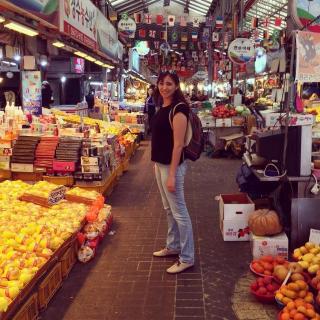Must-try Dishes
Jeju Black Pork - 흑돼지 (flavorful pork) - This is tender, marinated pork from the black pig breed native to Jeju, grilled to perfection. Locals often enjoy it at BBQ restaurants, typically sharing it with friends over a couple of hours.
Seaweed Soup - 미역국 (nutritious seaweed soup) - Made from fresh seaweed, this savory soup is cooked with beef or seafood and often served as a comforting breakfast. Eating it on your birthday is customary, as it represents good health.
Grilled Mackerel - 고등어 구이 (crispy fish) - A whole mackerel, highly seasoned, grilled until crispy on the outside and flaky inside. Commonly eaten for lunch, it’s often paired with steamed rice and pickled vegetables at local diners.
Gogi Jungol - 고기전골 (hearty meat stew) - This spicy stew is made with beef, mushrooms, and a mix of seasonal vegetables, simmered for a rich flavor. It's a popular dinner option, particularly enjoyed during family gatherings or celebrations.
Tangerine Salad - 귤샐러드 (refreshing citrus mix) - Jeju tangerines create a colorful salad mixed with local greens and a tangy dressing; surprisingly refreshing amid heartier dishes. At local markets, you can find this in the warmer months as a vibrant side dish.
Fish Cake Skewers - 어묵 (savory fish cakes) - These skewers consist of pressed fish made into a cake and grilled, often served at street stalls. By the way, locals often enjoy them with a splash of hot sauce, so don’t miss that touch!
Sujebi - 수제비 (hand-torn noodle soup) - A comforting noodle soup made with hand-torn dough, potatoes, and vegetables in a savory broth. Best enjoyed during cooler months, it's a cozy lunch choice popular among families to share warmth on chilly days.
Desserts & Drinks
Omeulmu 차 - 오믈무차 (barley tea) - A calming drink made from roasted barley, steeped until the water has a rich, nutty flavor. Locals often enjoy this soothing beverage throughout the day, especially during meals or on cool evenings.
Hallasan Soju - 한라산 소주 (local distilled spirit) - This smooth and light soju is made from sweet potatoes and features a hint of sweetness. It's commonly shared among friends during celebrations or evenings at home, often paired with Jeju’s specialty seafood.
Patbingsu - 팥빙수 (shaved ice dessert) - A delightful mound of finely shaved ice topped with sweet red bean paste, fruit, and condensed milk, creating a refreshing treat perfect for hot summer days. It's best enjoyed during local festivals or at popular cafes where families gather.
Omegwa - 오메과 (sweet rice cake) - These soft, chewy rice cakes are often filled with sweetened red bean paste and enjoyed during holidays and special occasions like Chuseok. Often served with a splash of sesame oil for extra flavor, they're a favorite among locals for festive gatherings.
Jeju Orange Juice - 제주감귤주스 (fresh citrus juice) - Made from the island’s famous mandarin oranges, this fresh juice bursts with sweetness and zesty flavor. Locals often drink it chilled as a refreshing pick-me-up during the warm months or while enjoying a scenic view of the ocean. By the way, a common mistake is asking for "orange juice" without specifying Jeju; it’s all about those local mandarins!


